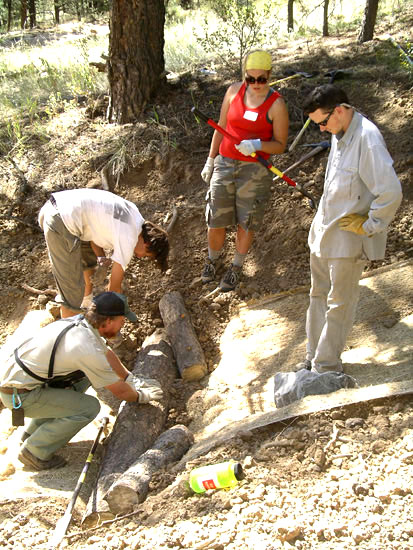A sweeping vision for forests
Speak up for A.B. 2575 now and help usher in new forestry era
A new forestry-reform
bill in Sacramento could have major
repercussions in the way logging is
conducted in California, closing
the most glaring failure of the Forest
Practice Act. Should the measure
become law, its impact could reverberate
across the state’s forests and
watersheds for decades. 
Forests cannot be protected on a project-by-project basis as the Board of Forestry has vainly attempted to do for so long. For the well-being of wildlife, watersheds, communities and forest-dependent industries, the state must evaluate logging projects cumulatively which is just what Assembly Bill 2575 would mandate.
The bill focuses on two groundbreaking pilot projects to be conducted by the California Dept. of Forestry (CDF) to develop and refine sound techniques for quantitatively assessing the effects of logging operations on soil, air, water, wildlife and climate, and to protect and repair salmon and steelhead habitat.
It would enhance public participation in timber harvests, watershed management and salmon restoration.
For the bill to pass, it needs an outpouring of public support. It needs your backing. Action is needed immediately.
On Monday, Apr. 19, the California Assemblys Committee on Natural Resources is scheduled to hold a hearing on A.B. 2575, the Comprehensive Forest Land Recovery and Restoration Act, introduced in February by Assemblymember Wesley Chesbro (D-North Coast), the newly appointed chair of the committee
Forests Forever is the organizational sponsor of the bill, and helped to develop it along with forest policy expert and Forests Forever Advisory Council member Richard Gienger.
TAKE ACTION:Write, call, fax, or email Assemblymember Wesley Chesbro (Assemblymember.Chesbro@assembly.ca.gov) — or leave him a message online — and thank him for introducing this important piece of legislation. Let him know you agree that evaluating and addressing the cumulative impacts of multiple timber harvests in a watershed over time is crucial to protecting watershed health, endangered species, public safety, and the long-term economic value of timberlands.
| Capitol
Office State Capitol P.O. Box 942849 Sacramento, CA 94249-0001 Tel: (916) 319-2001 Fax: (916) 319-2101 |
Humboldt
Office (Also represents Del Norte and Trinity Counties.) 710 E Street, Suite 150 Eureka, CA 95501 Tel: (707) 445-7014 Fax: (707) 445-6607 |
| Mendocino
& Lake Office 311 N. State Street Ukiah, CA 95482 Tel: (707) 463-5770 Fax: (707) 463-5773 |
Sonoma
Office 50 "D" Street, Suite 450 Santa Rosa, CA 95404 Tel: (707) 576-2526 Fax: (707) 576-2297 |
Also contact your local Assemblymember and urge him or her to back A.B. 2575 either when it comes before them in committee, or when the bill is considered by the full chamber.
To find your Assemblymember
and contact information, visit the
California State Assembly Internet
portal at http://www.assembly.ca.gov/
BACKGROUND:
The strong emphasis in A.B. 2575 on assessing the cumulative impacts of multiple logging projects in a watershed over time is a key forestry reform long sought by Forests Forever.
Chesbro formulated A.B. 2575 in large part to dovetail with final regulations adopted last September by the Board of Forestry (BOF).
The BOF regulations govern commercial timber harvests on watersheds where anadromous fish species have been designated as threatened or endangered.
The rules require the BOF and CDF to work with other agencies, stakeholders, and appropriate scientific participants in a transparent process to describe and implement two pilot projects to address cumulative watershed impacts.
This bill would require the CDF to start really making use of cumulative impact data, said Forests Forever Legislative Advocate Luke Breit. And, as pilot projects often become the law of the land, this could have a huge impact on how logging is carried out throughout the state.
As the Chesbro bill puts it, A good cumulative effects process can provide the information necessary to restore and recover fish and wildlife populations, to improve the quality and quantity of timber, to take actions to reduce fire hazards, to sequester carbon, to produce energy, and to create jobs in taking on these vitally important tasks.
In addition, A.B. 2575 would compel the CDF to ensure that its pilot projects balance public, industry and agency involvement. In the past, the public has been effectively shut out.
Toward that end, the act would require the CDF to post all electronically available timber harvest plans online for easy access to the public as well as agencies and timber operators.
###
©2025 Forests Forever. All Rights Reserved.